Encyclopedia Brown Takes the Case (2 page)
Read Encyclopedia Brown Takes the Case Online
Authors: Donald J. Sobol

“The house was too hot for Mr. Aukland to have seen two men robbing the safe,” answered Encyclopedia. “He made them up.”
HOW DID ENCYCLOPEDIA KNOW?
(Turn to page 87 for the solution to The Case of the Stolen Money.)
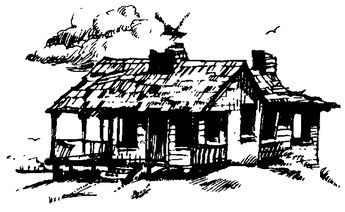
The Case of the Talking House
Encyclopedia helped his father solve mysteries throughout the year. In the summer, he helped the neighborhood children as well.
When school let out, he opened his own detective agency in the garage. Every morning he hung out his sign.
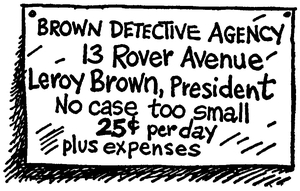
His first customer Monday afternoon was Scoop McGinnis.
Scoop was five. He could neither read nor write. But with the help of his older sister, he put out a two-page weekly newspaper,
The Cricket.
The Cricket.
The Cricket
was by kids, for kids, and about kids. It stood for good citizenship, zoos, toys, and better hot dogs. It was against bad candy and people who didn’t like
The Cricket.
was by kids, for kids, and about kids. It stood for good citizenship, zoos, toys, and better hot dogs. It was against bad candy and people who didn’t like
The Cricket.
When he came to see Encyclopedia, Scoop was sucking his forefinger.
Right away Encyclopedia knew something was wrong. Scoop usually sucked his thumb.
“You know the old Webster house on the beach?” asked Scoop.
Encyclopedia knew it. No one had lived there for years and years. The window glass had fallen out. Six inches of sand covered the floors.
“The house is so old it’s dangerous,” said Encyclopedia. “The city plans to knock it down next week.”
“That house was mad,” said Scoop. “It bited me.”
“You mean it
bit
you,” corrected Encyclopedia. Then he caught himself. “Houses don’t bite! ”
bit
you,” corrected Encyclopedia. Then he caught himself. “Houses don’t bite! ”
“Look at my finger,” said Scoop.
Encyclopedia looked. “You’ve got a splinter,” he said.
Scoop frowned. “If that house didn’t bite me, then maybe it didn’t talk to me.”
“Keep calm,” Encyclopedia told himself. “I was once five years old myself.”
To Scoop he said, “Would you mind starting at the beginning, please?”
“This morning after breakfast, I interviewed that house for
The Cricket,”
said Scoop. “I wanted to know how it felt about being knocked down.”
The Cricket,”
said Scoop. “I wanted to know how it felt about being knocked down.”
“That’s when it bit you?”
“That’s when it talked to me,” said Scoop. “It said it takes a lot of money to save a house. It told me to go home and bring all my money. I did—a dollar and fifty cents.”
“It wasn’t enough,” guessed Encyclopedia.
“How did you know?” said Scoop. “Because I didn’t bring more, the house got mad and bit me—I thought. I dropped the money and ran.”
“Were you alone in the house?” inquired Encyclopedia.
Scoop shook his head. “As I was running out, I saw a big kid in the next room trying to hide. I think it was Bugs Meany.”
“Bugs! ” exclaimed Encyclopedia. “I might have known he was mixed up in this!”
Bugs Meany was the leader of the Tigers, a gang of tough older boys. Encyclopedia was often called upon to stop their dishonest doings.
Only last week he had put a halt to the Tigers’ “Giant Summer Pet Sale.” Bugs had dipped seven sparrows in peroxide and tried to sell them as canaries.
“Can you get back my money?” asked Scoop. “I’ll have to pay you later.”
“Don’t worry about it,” said Encyclopedia.
He took out Scoop’s splinter, and the two boys set off for the old beach house.
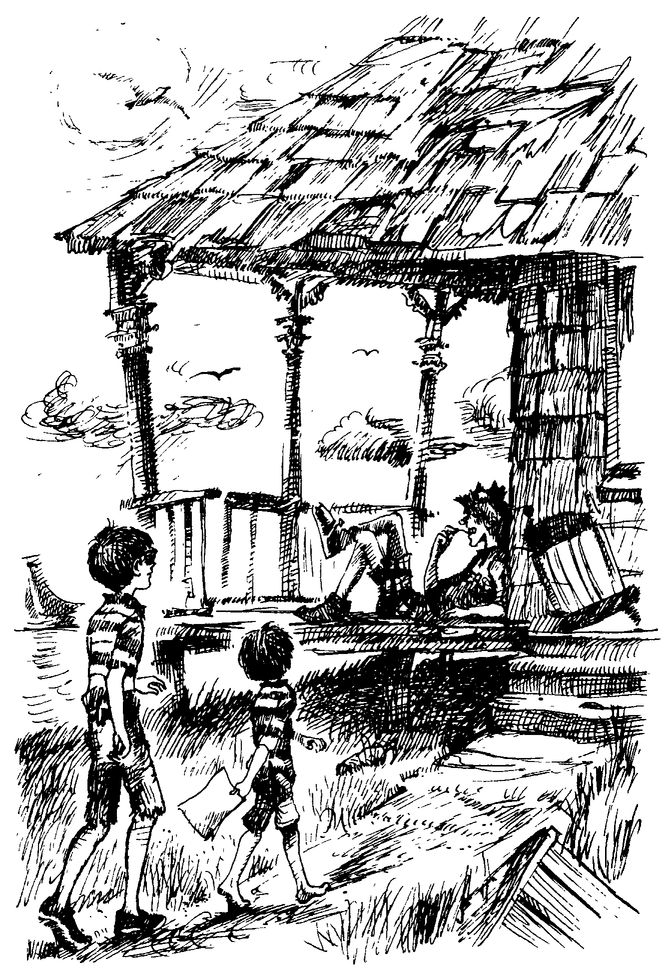
Bugs lay on the porch. He was scratching his dandruff and picking his teeth.
“Bugs must have seen you run away,” Encyclopedia told Scoop. “He knew you were heading to see me. He’s probably waiting for us-with an alibi!”
Encyclopedia was right. Bugs lay on the porch. He was scratching his dandruff and picking his teeth. When he saw the boy detective, he sat up quickly.
“Scram, or your face will need help,” he snarled.
Encyclopedia was used to Bugs’s warm welcomes. He nodded and went inside with Scoop. Bugs followed them.
Scoop stopped among the many footprints in the deep sand that covered the living-room floor.
“I started to put the dollar and a half on that shelf,” he said. “Then the splinter bit me. I got scared. I dropped the money and ran.”
Encyclopedia studied the large cracks in the walls. “Bugs could have stood in the next room, watching and listening,” he said.
“What’s with you two crazy cats?” demanded Bugs. “I came here for some wood. I’m adding a poolroom to the Tigers’ clubhouse.”
“You made me think the house was talking,” said Scoop. “You took my money.”
“I didn’t take anything except a nap,” said Bugs. “The wood in this dump wouldn’t make a good slop bucket.”
He began walking slowly around the room.
“Your money is still here if you
really
dropped it,” he declared. “You shouldn’t go around accusing people of stealing. There are laws against that sort of thing.”
really
dropped it,” he declared. “You shouldn’t go around accusing people of stealing. There are laws against that sort of thing.”
Suddenly he gave a cry and pointed.
In the sand on the floor lay a half dollar. Under it was a dollar bill.
“G-gosh, Bugs,” stammered Scoop. “I thought the worst of you. I’m sorry.”
“Don’t be,” said Encyclopedia. “If you hadn’t run out of the room and seen Bugs, he’d have kept your money!”
WHAT MADE ENCYCLOPEDIA
SO CERTAIN?
SO CERTAIN?
(Turn to page 88 for the solution to The Case of the Talking House.)
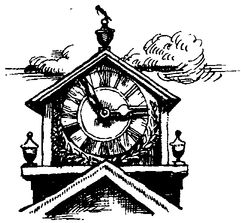
The Case of the Two-Timers
If Bugs Meany had a goal in life, it was to get even with Encyclopedia.
Bugs hated being outsmarted all the time. He longed to sock the boy detective on the side of his face so hard that he could look down his back without turning his head.
But Bugs never threw the punch. Whenever he felt like it, he remembered a pair of lightning-fast fists.
The fists belonged to Sally Kimball, Encyclopedia’s partner. Sally was the prettiest girl in the fifth grade as well as the best athlete. And she had done what no boy under twelve had dreamed possible.
She had out-punched Bugs Meany.
Every time they had come to blows, Bugs had ended on the ground, mumbling about falling rocks.
Because of Sally, Bugs was afraid to use muscle on Encyclopedia. However, he never stopped planning his day of revenge.
“Bugs hates you as much as he hates me,” Encyclopedia warned Sally. “He won’t ever forgive you for showing him up.”
“I know,” said Sally. “He’s more like a magician than a Tiger. He can turn anything into trouble.”
“Trouble,” thought Encyclopedia, “may be where we are heading.”
The detectives were walking in downtown Idaville. Half an hour earlier, Lefty Dobbs had telephoned them. Lefty had said to meet him in front of the city hall right away.
“I wonder why Lefty didn’t tell you what this is all about,” remarked Sally.
“Perhaps he couldn’t talk freely over the telephone,” replied Encyclopedia. “Anyway, we’ll soon find but. There he is.”
Lefty was standing outside the city hall. He saw the two detectives, but he didn’t wave. Instead, he took off his wristwatch.
“He’s acting awfully nervous,” whispered Sally as they drew closer. “I don’t trust him.”
With his right hand, Lefty held his watch by the metal strap. Between his left forefinger and thumb he turned the tiny knob that set the time.
As he did, he checked the big clock atop the city hall. It showed five minutes before three.
“Are you okay?” Encyclopedia asked him.
“Sssh!” hissed Lefty. “Keep your voice down.”
“What’s the big secret?” asked Sally.
“Show me your palm, Encyclopedia,” said Lefty.
Encyclopedia held out his hand, palm upward.
Lefty laid twenty-five cents on it. “I want to hire you,” he said.
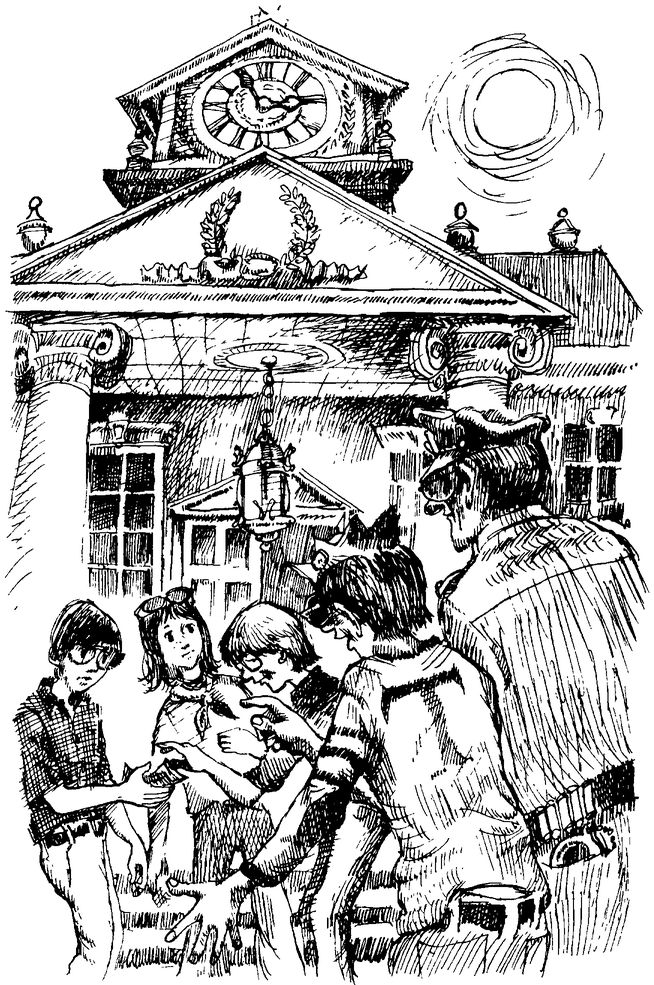
“There! You saw it yourself, officer!”
For a moment he stared up at the clock atop the city hall with a thoughtful expression. Then he fished into his pocket and took out a five-dollar bill. He gave it to Encyclopedia.
“This case is extra tough,” he whispered. “So I’ll pay more.”
“There! You saw it yourself, officer!”
It was Bugs Meany. He came charging out of a nearby dress shop. Behind him was Officer Hall.
“I told you we’d catch them in the act, the little crooks!” cried Bugs.
“You’d better have an explanation,” Officer Hall said to the detectives. “I saw everything through these binoculars Bugs lent me.”
“They’ve been working this racket for weeks,” said Bugs.
“What racket?” gasped Sally, bewildered.
“Bugs told me that you wait until some child stops to set his watch by the time on the city-hall clock,” said Officer Hall. “Then you approach him. You tell him the price for setting his watch is twenty-five cents.”
“Encyclopedia told me he owned the clock,” put in Lefty.
Bugs had been shaking his head sadly as he listened. Now he clasped his hands over his chest and put on a righteous face.
“So many kids came to me with complaints,” he said. “I knew it was my duty as a good citizen to go to the police. Of course, I hated doing it. I’m so sensitive, so high-strung.”
Other books
The Emerald Virgin (Gem Apocalypse Book 1) by Ravyn Rayne
Love for Beginners: An Under the Hood Novella by Sally Clements
Sam: A Novel Of Suspense by Wright, Iain Rob
Silent Witness by Rebecca Forster
The Diary of Bink Cummings: Vol 3 (MC Chronicles #3) by Bink Cummings
Heaven and Hell by Jon Kalman Stefansson
Smart vs. Pretty by Valerie Frankel
A Scarlet Cord by Deborah Raney
The Magdalen by Marita Conlon-McKenna
TheTemptationNotJustifiedAReFinal by Delaney Diamond